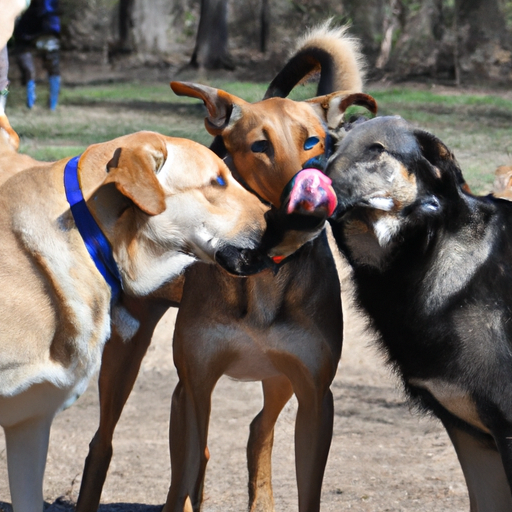Understanding Canine Behavior
Dog behavior can often seem strange and bewildering to us humans, especially if you’re not well-versed in dog psychology. But as a caregiver, understanding why your dogs engage in certain behaviors can help you better meet their needs and ensure they’re happy and healthy. This includes understanding why your dogs might lick each other’s mouths.
This behavior is actually quite common in the canine world, and is known as ‘mouth licking’ or ‘kissing’. It’s thought to have its roots in the behavior of wild wolves, which lick each other’s mouths as a way of expressing social status and reinforcing social bonds.
For example, a submissive dog might lick the mouth of a more dominant dog as a way of showing respect and deference.
The Communication Aspect
Mouth licking can also be a way for dogs to communicate with each other. Dogs have an incredibly keen sense of smell, and by licking each other’s mouths, they can pick up on a whole host of information about each other. This might include what the other dog has eaten recently, their health status, and even their emotional state.
In addition, mouth licking can also serve as a way for dogs to comfort and reassure each other. If one dog is feeling anxious or stressed, the other dog might lick their mouth as a way of saying “it’s okay, I’m here for you”.
Here are some reasons why dogs might lick each other’s mouths:
- To express social status.
- To communicate with each other.
- To comfort and reassure each other.
Health Considerations
While mouth licking is generally a normal and healthy behavior, it’s important to keep an eye out for any signs that it might be causing problems.
For example, if one dog is constantly licking the other dog’s mouth to the point of obsession, it could be a sign of anxiety or stress. Similarly, if the other dog seems distressed or uncomfortable with the licking, it might be a sign that there’s a problem.
Here are some signs to watch out for:
- Excessive licking
- Signs of distress or discomfort in the dog being licked
- Changes in behavior or appetite
Training and Management
If you’re concerned about your dogs’ mouth licking behavior, there are several steps you can take to manage it.
First, try to understand why your dogs are engaging in this behavior. Is it a sign of stress or anxiety? Or is it just a normal part of their social interactions?
Next, consider whether there’s anything you can do to reduce any underlying stress or anxiety. This might include providing more exercise, mental stimulation, or training.
Finally, if the behavior continues to be a problem, don’t hesitate to seek professional help. A qualified dog behaviorist or trainer can provide valuable insights and advice.
FAQ
-
Is mouth licking normal in dogs?
Yes, it’s a common behavior that’s rooted in their wild ancestors. -
Should I be concerned if my dogs lick each other’s mouths?
Generally, no. But if you notice signs of distress, or if the behavior becomes obsessive, it’s a good idea to consult a vet or a dog behaviorist. -
Can mouth licking spread diseases?
While it’s possible, it’s not common. If you’re concerned, make sure your dogs are up-to-date on their vaccinations and regular health checks. -
How can I stop my dogs from licking each other’s mouths?
Try to understand why they’re doing it, provide more exercise and mental stimulation, and consult a professional if needed. -
Is mouth licking a sign of dominance?
It can be, but it’s also a form of communication and social bonding.



